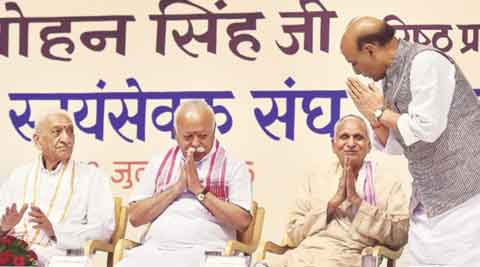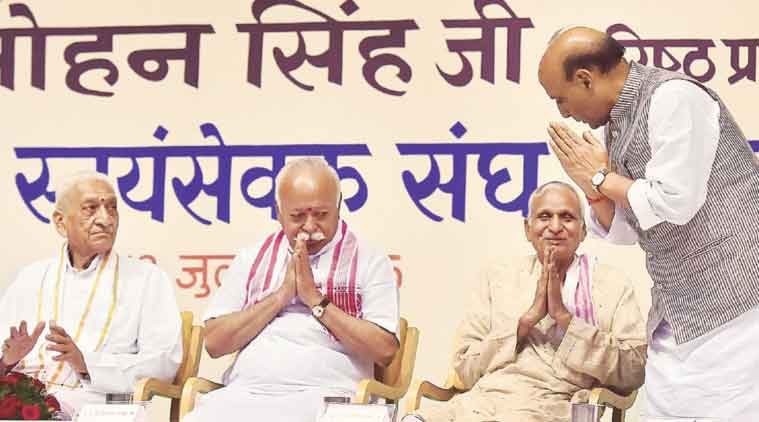Opinion Mind your language
Panchjanya is utterly misguided about English and Hindi

 RSS chief Mohan Bhagwat (centre) greets Home Minister and BJP leader Rajnath Singh during a function in Delhi. (Source: PTI photo)
RSS chief Mohan Bhagwat (centre) greets Home Minister and BJP leader Rajnath Singh during a function in Delhi. (Source: PTI photo)
Panchjanya, the RSS foghorn, recently published an editorial titled “Bharat ki taakat hai Hindi”—“Hindi is India’s Strength”. This had me scratching my Tamilian head (a space where Hindi cohabits with English, Tamil, Urdu, Spanish and a smattering of Punjabi and Portuguese). India’s strength…really?
India has many strengths: its natural resources; its democracy; its armed forces; an enviable entrepreneurial spirit; a vast pool of scientifically trained labour; a vaster pool of young unskilled manpower, which economists call the demographic dividend; and an immense diaspora, which waves the tricolour with one hand while remitting money to the Motherland with the other ($70 billion per annum, plus another $30 billion through “hawala”).
Oh, and did I mention the English language, which enables India to connect and deal with the world in ways that have many other countries wracked with envy? Can you imagine how much higher China would have skyrocketed if it had been able to count on a big enough pool of English-speakers at the start of its economic miracle? And English doesn’t merely help India deal better with the world, it helps Indians who settle in the West integrate more quickly than other immigrants, turning them into more effective assets in the broader service of India.
But Hindi? Pull the other one, Panchjanya. Apart from Bollywood — which has turned Hindi into a species of national “apun ka khichdi bhasha” that bears no relation to Premchand — Hindi’s contribution to the national economy is arguably paltry. Without English, India would be floundering. The market capitalisation of India’s IT sector stands at about $250-$300 billion. Add to that about $150-$200 billion worth of unlisted companies, and you have $500 billion worth of “English dividend” right upfront. And that’s just IT.
But try telling this to the editors of Panchjanya, whose belligerently illiterate position is that English must be cleansed from India so that Hindi gets some sort of (mythical) rightful due. (Illiterate is a word I use deliberately, as the online version of the editorial in question is riddled with type-setting errors that would put a schoolgirl publication to shame.)
While paying lip-service to the validity of other Indian languages, Panchjanya persists in the belief that Hindi is, somehow — and by right — the first among equals. The Hindi uber alles lobby cannot seem to shake off the idea that there is a hierarchical order of Indianness, with Hindi speakers at the very top, and all those funny, squiggly southern languages in obeisant lower places.
This has resulted in repeated attempts to impose the language of the teeming, impoverished northern masses on unwilling takers in other parts of India who have long ago outstripped Hindi-speakers in their material and economic achievements.
But the market has its own irrefutable logic: If you were a professionally ambitious speaker of Malayalam, for instance, which second language would stand you in better stead? English, of course, and so much more so now that India’s economy has emerged from its autarkic ways, allowing its citizens to buy from, sell to, and travel around the world. In foisting Hindi on India, the RSS would simply provide a boost to private schools in India.
Yet the organic forces of the market appear not to matter to the RSS editorialists. They would sweep English away, persisting in a hackneyed description of the language as a colonial tool that “divides and rules”. In doing so, they might consider a change in the name of their own organisation, from the Rashtriya Swayamsewak Sangh to the “Rashtriya Aatmahatyak Sangh” — National Suicide Organisation. For the banishing of English from India would be an infliction of self-harm on a national-suicidal scale.
The editorial ends with a perverse form of chest-thumping, and a call for sarkari intervention: Look at how much Hindi has achieved without government support, it says. Imagine how strong Hindi would be with some real official backing! This, I fear, gets matters exactly the wrong way around. It reflects a belief that society can be moulded peacefully by government diktat.
What next? Will the government force Indians to stop eating certain foods in the privacy of their homes? Oh wait, it does that already…
Tunku Varadarajan is the Virginia Hobbs Carpenter Fellow at Stanford University’s Hoover Institution
@tunkuv


